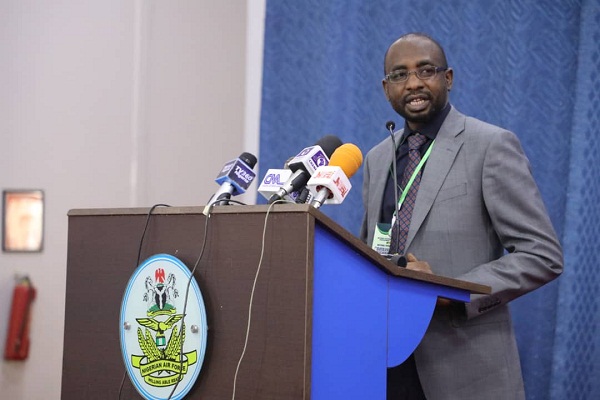Telecom
NITDA Recommends Use of Big Data to Build Viable Digital Economy

Mallam Kashifu Inuwa Abdullahi, Director General of the National Information Technology Development Agency (NITDA) has said that building and harnessing of big data is a panacea for building a strong Digital Economy.
Mallam Inuwa Abdullahi disclosed this at the 2nd Nigeria Data Summit Theme: “Leveraging National Data for Nigeria’s Digital Economy Development” held (virtual) on Friday.
He explained that for the country to build a Digital Nigeria with a strong Digital Economy, we need a solid strategy for the exploration and management of our vital resource that drives Digital Nation and Digital Economy, which is data.
According to the NITDA Boss, “As we embarked on our journey to Digital Nigeria, we need to lay a strong foundation for its corresponding economy, the digital economy”.
Equally, the NITDA Director General, said that just as the physical natural resources are driven by oil, so also is data the primary resource that drives the digital economy.
He said, “The phrase “Data is the new oil” exposes certain similarities between data and oil.
“Just like oil, data needs refining before its actual value can be unlocked.
“Data also needs exploration and processing to extract its value or meaning significantly.
On the other hand, Mallam Inuwa Abdullahi said that there are some dis-similarities between data and oil, according to him, “while oil is a finite resource, data is infinite and reusable resource, it also has more varieties than oil, and can easily be moved and transported from one point to the other”.
He noted that several developed countries across the world are already using big-data for monetary and fiscal policy formulation, combating the Financing of Terrorism (CFT); crime prediction and prevention, national defence/security management; national planning and budgeting; together with disaster prevention and management, among others.
Mallam Inuwa Abdullahi further explained that the essence of the Data Summit was to help the country build a successful digital nation and a corresponding digital economy.
He further revealed that the outcome of the summit and other existing national data regulations, guidelines, standards, and policies will be leveraged to develop a solid national data exploration and management strategy for our digital landscape.
“Consequently, we are going to leverage the outcome of this summit and other existing national data regulations, guidelines, standards, and policies to develop a solid national data exploration and management strategy for our digital landscape.
“The strategy is aimed to achieve three objectives, to identify action items to transform the Nigerian big data landscape and help the government to develop the capabilities required for effective data exploration and management.
“To develop a comprehensive and time-bound roadmap of how we are going to explore and manage our big data.
“And to come up with an execution plan on how to close the gap between where we are currently and where we desire to be in the area of data exploration and management”.
Mallam Inuwa Abdullahi also submitted that the initiative is in line with President Muhammadu Buhari’s campaign promise in the area of Security, Economy, and Anti-corruption.
Telecom
NCC Asks Consumers to Monitor Data Usage to Authenticate Consumption

Nigerian Communications Commission (NCC) has charged the over 174 million telecoms subscribers in the country to constantly monitor their data usage to authenticate their consumption level.

This follows concerns being raised by telecoms consumers about the rapidity of data depletion on their devices.
The Commission particularly enjoined the consumers to always contact their service providers to make requests for cases of discrepancies noted in their data usage.
While the consumers are expected to contact their service providers to request for their usage history/statement where inconsistency exists in their data usage as first step, the Commission said they may also escalate such issues to the Commission through its toll-free Number 622 and social media platforms, especially if their requests are not satisfactorily handled.
The Commission, which also made some clarifications regarding the concerns being raised by the consumers around data usage, said the need to inform the consumers on their concerns is part of its commitment to protect and appropriately inform and educate the telecom consumer on industry issues.
Making further clarifications around data speed and usage, the Commission said data speed is the speed at which data is transferred between two devices, measured in megabits per second (Mbps or mbps), stressing that given the spread of Internet services and the immense investment in the sector, data rates have continued to increase and users may be unaware of how to measure data speed.
The telecoms regulator explained further that websites such as www.fast.com also provide an easy way for consumers to measure Internet speed on any device at any location.
“The higher the data speed, the quicker pages load-downloads and uploads-occur and expectedly, the quicker data bundles are exhausted. So, as telecom consumers are able to do more on devices in less time, some consumers’ devices & network service providers make it possible to limit data speed to help users manage data usage better.
“In any case, most devices now include functions to measure data used by devices and it is imperative that users monitor same to authenticate data usage, such as applications left running on devices. Therefore, where discrepancies occur users may contact their service provider to request for their usage history/statement. If request is not dealt with satisfactorily then, users can contact NCC by calling 622 or engage the Commission via its social media platforms”.
It added that the data usage experience is a function of location, network equipment and users connected in a particular location.
Telecom
Phone Theft: AMCODET Urges Mandatory Registration @ Point of Purchase

Association of Mobile Communication Device Technicians of Nigeria (AMCODET), has called on the Nigerian Communications Commission (NCC) to make it mandatory for mobile phones to be registered at the point of purchase.

According to Kehinde Apara, president of AMCODET, implementing this registration process would significantly help in combating phone theft and assist in locating stolen devices.
Apara, made this appeal in an interview in Lagos on Monday.
He stated, “Registration of mobile phones will reduce theft to the barest minimum, as it will be difficult for thieves to sell registered stolen phones.”
Apara explained that the registration of new phones would also help to reduce the harassment faced by technicians by security agencies.
“So many of our members have been labelled accomplices in theft cases, because customers bring stolen phones to them to repair. We believe this is unfair to such innocent people,” he said.
He went on to highlight that the NIN-SIM linkage, which was originally an idea brought forward by AMCODET, was created to curb insecurity and theft.
However, Apara pointed out that “It is not enough.”
He stressed the need for further measures to ensure the proper registration of mobile phones, emphasising that such a step would make it easier for technicians to identify stolen devices brought in for repair or flashing.
“AMCODET has been at the forefront of organising seminars on the security of mobile phones and has also been sensitising the public and authorities on the challenges faced by the association due to phone theft. There is no way our members can identify if a phone is stolen when brought to them for repairs or flashing, but if the phone is registered, the technician can more easily identify it,” he explained.
Apara also expressed a desire for closer collaboration with security agencies, saying, “We want to work with security agencies to ensure that phones are properly registered, theft is prevented, and thieves are brought to book.”
In additin to the call for phone registration, Apara appealed to individuals and the private sector to support efforts to develop the mobile phone industry in Nigeria.
He remarked, “We need individuals’ support to develop our industry, rather than relying on government for everything.”
He emphasised that Nigeria has the capacity to develop its own technology and reduce reliance on imported devices, “With the support of individuals and the private sector, Nigerians can begin to develop its own technology, rather than relying on imported technology.”
Apara expressed optimism for the future of the mobile phone industry in Nigeria, believing that with the right support, the country could build its own technological solutions and move towards greater self-reliance.
“We can develop our own technology.”
“But we need the support of individuals and organisations to make it happen,” he said.
Credit: NAN
Telecom
Apple Faces €150M Fine in France Over Alleged Antitrust Violations

French antitrust regulators have fined Apple 150 million euros ($162 million) over its App Tracking Transparency (ATT) feature, which is facing scrutiny in multiple European countries.

The French Competition Authority ruled that Apple’s implementation of ATT was “neither necessary nor proportionate to the company’s stated goal to protect user data” and unfairly penalized third-party publishers.
Alongside the financial penalty, Apple has been ordered to publish the decision on its website for seven days. The ruling comes amid ongoing investigations in Germany, Italy, Romania, and Poland into ATT, which Apple introduced in 2021 as a privacy safeguard.
ATT requires apps to obtain explicit user consent via a pop-up before tracking activity across other apps and websites. If users decline, the app loses access to their advertising identifier, limiting targeted advertising. Critics argue that the system disproportionately benefits Apple by restricting competitors while promoting its own advertising services.
The French watchdog found that ATT forces users to navigate excessive consent windows for third-party apps on iPhones and iPads, making the process unnecessarily complicated.
Additionally, Apple’s system requires users to opt out of ad tracking twice rather than once, which the authority said undermines the feature’s neutrality and causes economic harm to app publishers and ad service providers.
The ruling emphasized that smaller publishers, which rely heavily on third-party data collection for revenue, are particularly affected.
The French regulator initially declined to impose emergency measures in 2021 after complaints from the advertising industry, but continued its investigation, ultimately leading to Monday’s decision.

 Telecom3 days ago
Telecom3 days agoMTN, Lynk Global Make Africa’s First Satellite-to-Mobile Call

 E-Business3 days ago
E-Business3 days agoSystemSpecs’s Subsidiary Deelaa Becomes Whatadeal

 E-Financial3 days ago
E-Financial3 days agoNigeria Gets Fresh $500m World Bank Loan for Economic Stimulus Programme

 Broadcasting2 days ago
Broadcasting2 days agoDStv Revenue Plunges as MultiChoice Loses Nearly 4m Subscribers

 General News3 days ago
General News3 days agoSERAP Asks National Assembly to Drop Bill to Jail Nigerians who Fail to Vote

 E-Financial3 days ago
E-Financial3 days agoUninsured Depositors of Heritage Bank to Receive Liquidation Dividends In April – NDIC

 Telecom3 days ago
Telecom3 days ago15-Year-Old Autistic Artist, Kanye, to Unveil World’s Largest Art Canvas on Autism Awareness Day

 Telecom3 days ago
Telecom3 days agoSmart Treasure Investment Team’s Initiatives Eradicate Poverty, Says Aminu



























